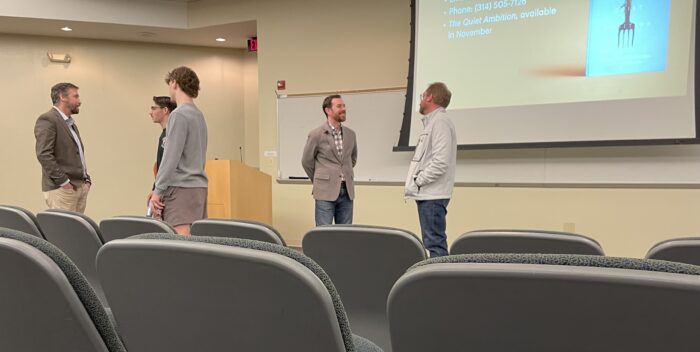Guest speaker Rev. Dr. Ryan Tinetti urges audience of Concordia Nebraska students and faculty to “live quietly”
The Rev. Dr. Ryan Tinetti (second from right) speaks with Concordia students and faculty after his presentation “Living Quietly in a Noisy Age.”
Photo credit: Alison Galchutt
By Alison Galchutt
An assistant professor from Concordia Seminary St. Louis gave a presentation in Concordia University, Nebraska’s Thom Auditorium in February where he told his more than 50 audience members to follow the guidance of 1 Thessalonians 4:11 and “make it your ambition to live quietly.”
The Rev. Dr. Ryan Tinetti, who has a doctorate in ministry, served as a parish pastor for 14 years before becoming the assistant professor of Practical Theology at Concordia Seminary St. Louis, where he works now. Tinetti has also written two books: “Preaching by Heart” and “A Quiet Ambition,” the latter of which was the basis for his presentation.
Tinetti said the thing that keeps people from living quietly is noise, which he defined as anything that distracts people from the truth. Tinetti said noise has the power to imperil a person’s spiritual well-being, which makes it a matter of life and death “because we know that Holy Scripture is God’s Word of truth and that our Lord Jesus is the truth incarnate.”
In his presentation, Tinetti identified four kinds of noise: noise itself, busyness, devices, and Satan’s voice. Tinetti said there are a number of ways to deal with these types of noise, the first being to recognize noise as a problem. Even when people cannot remove themselves from the noise, Tinetti said it still helps to recognize it.
This practice of recognition is something that Assistant Professor of Theology Rev. John Genter found especially helpful.
Genter said it is important “to appreciate that on the one hand that there are a lot of things that we can’t do about busyness, and that’s ok, but there are things we can do and should do. And sometimes small changes can have a big impact.”
Tinetti also recommended that his audience try to not schedule every minute of their free time. Speaking for himself, Tinetti said, “I don’t have to fill it [my schedule] up until I feel like I’m totally burnt out and wiped out.”
Just as financial advisors say it is important to live below one’s means of income, Tinetti said it is important to schedule below one’s means of busyness.
Genter said this was an especially important message for church work students to hear, as he said church workers can have a problem with burning themselves out by not setting good boundaries.
“I think it is really hard for church workers not to burn themselves out, and they feel guilty saying no and setting boundaries,” said Genter. “I think if they can frame those things rightly, as like positive, correct things to do, it helps a lot to do it when you should.”
Tinetti said another way to combat busy schedules is by scheduling downtime, which freshman Mitchell Stephens said was one of his main takeaways.
Stephens said he wanted to start “actually scheduling times, like [Tinetti] said, to go on walks. I think, now that the weather is a lot better, I really want to get back into that, or just time to hang out with friends.”
Tinetti identified three people who he said are good examples of quiet living. One of them was Christian songwriter Rich Mullins, known for writing “Awesome God.” Tinetti said he was a good example of “quiet simplicity.” Even though Mullins’ music made a lot of money, Mullins used very little of it, donating most of it to local churches and other organizations.
The second person Tinetti pointed to was Dietrich Bonhoeffer for his “quiet conviction” as he left his calm life in England to go back to Nazi Germany and serve the church there. The third and final person Tinetti mentioned was his mother, who he said modeled “quiet joy,” even when her life looked like there was nothing to rejoice over.
Junior Grace Donnelly said that it is important for people to consider how living quietly looks in their own lives.
“There’s so many different ways that you can live quietly,” Donnelly said. “You have to take it and decide, ‘ok how do I actually want to apply this to my life and my specific situation?’”
Genter said he thought this presentation was timely and applicable for everyone to hear, but especially for church work students.
“I think everybody here can implement these things, but I think church work is an area where we really need to take that seriously,” he said.




















